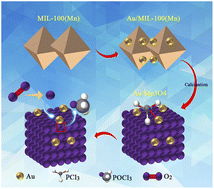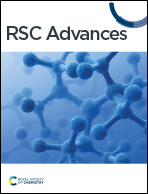Manganese-oxide-supported gold catalyst derived from metal–organic frameworks for trace PCl3 oxidation in an organic system†
Abstract
Polysilicon is widely used in the field of semiconductors and solar energy. Trichlorosilane feedstocks that are used to produce polysilicon in the mainstream production process contain PCl3 impurities that have adverse effects on the quality of the polysilicon. Traditional methods for dephosphorization cannot achieve the effect of complete removal, whereas oxidizing PCl3 to POCl3 in the presence of oxygen for removal via adsorption is a promising and appealing route for establishing a dephosphorization process; it has a high phosphorous removal rate due to the strong Lewis-base property of POCl3 in comparison with PCl3. In this work, we synthesized an active catalyst with an active interface between Au nanoparticles (NPs) and a manganese-oxide support (Mn3O4) by calcination of a corresponding composite, where Au NPs were embedded uniformly in a metal–organic framework (MOF). The catalyst shows a significantly active catalytic performance for trace PCl3 oxidation in an organic system that is an imitation of a trichlorosilane system, with a 99.13% yield of POCl3 in an 80 °C and 0.6 MPa reaction environment. The structure–performance–mechanism analysis shows that the possible reaction and catalytic mechanism is PCl3 oxidation by interface lattice oxygens, which bridge the Au NPs and the support, in a Mars van Krevelen (MvK) process; this process was promoted by the interaction between the Au NPs and Mn3O4 in terms of charge transfer and chemical potential changes. This work provides an effective way to dephosphorize trichlorosilane feedstocks in the polysilicon industry and gives guidance for constructing an efficient catalyst via the study of the structure and mechanism.



 Please wait while we load your content...
Please wait while we load your content...